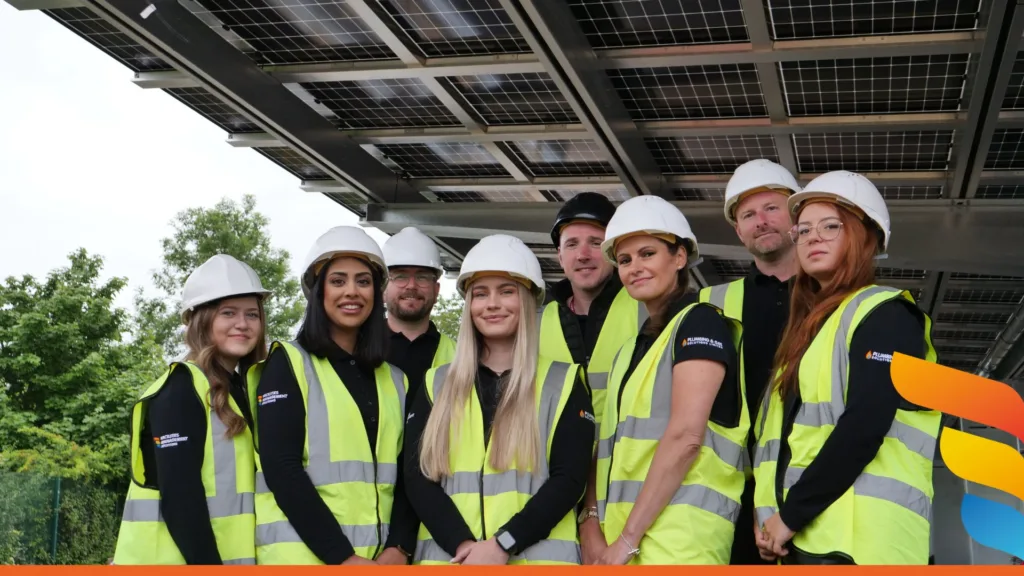Driving Sustainability
Brioche Pasquier, the renowned French bakery and pâtisserie brand, operates a large-scale manufacturing facility in Milton Keynes. Deeply committed to sustainability and continuous improvement, Brioche Pasquier sought new ways to lower its carbon footprint and future-proof its UK operations.
The challenge was that most of the factory’s roof space was unsuitable for solar panels, yet the company was determined to harness renewable energy. FMS was engaged to explore and deliver an alternative solution. The result is a 615kW car park solar canopy system with 1,158 panels across three steel structures designed, managed, and delivered end-to-end by FMS.
The project represents the perfect blend of engineering precision, environmental innovation, and meticulous planning. It demonstrates how FMS transforms complex site constraints into efficient, sustainable energy solutions.
“From our first discussions with FMS, it was clear they understood both the complexity of our site and the ambition of our sustainability goals. They designed and delivered a system that overcomes the limitations of our roof space and gives us a long-term, reliable source of renewable energy. The finished canopy is impressive, highly functional, and already making a meaningful difference to our carbon footprint.”
Ryan Peters, Managing Director, Brioche Pasquier UK
The Challenge: When Roofs Aren’t an Option
At first glance, Brioche Pasquier’s facility appeared a perfect candidate for rooftop solar. However, closer inspection revealed multiple barriers:
- Unusual roof construction – The main production warehouse roof has a flexible surface. When walked upon, it moves slightly underfoot, which meant it could only take limited loading in certain areas.
- Shading and light tunnels – The office roof incorporates highly efficient European-style mirrored light tubes that channel daylight inside. These cannot bear weight, and panels placed around them would prevent the light tunnels from delivering with other parts of the office roof being heavily shaded.
- Chimneys and exhausts – Large oven flues vent steam and vapour around the roofline, meaning significant cleaning and maintenance are required. Any panels nearby would be coated.
- Operational and structural limitations – Because of the roof’s design and periodic cleaning needs, installing solar there would be costly, disruptive, and yield limited output.
With the roof ruled out, Brioche Pasquier’s leadership turned to FMS for guidance. Being a French company, they were aware that France already mandates solar canopies for large commercial car parks, and they were keen to explore a similar concept in the UK.
FMS’s brief was simple but demanding; to find a sustainable, structurally sound, and financially viable solar solution for a busy, operational site.
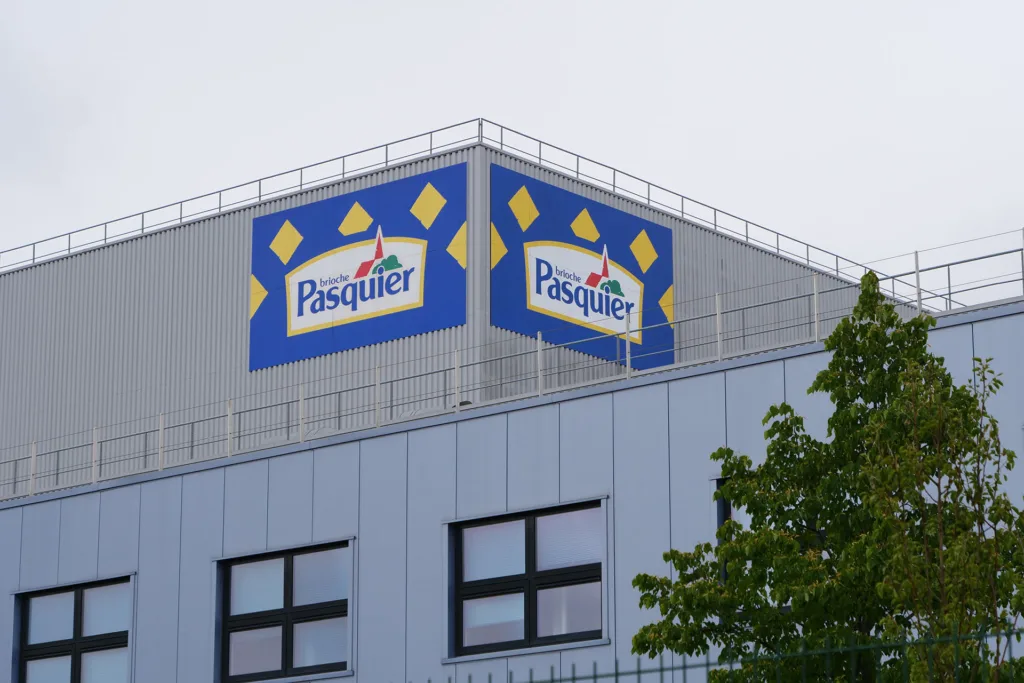
Exploring the Options
The FMS process began with a free desktop feasibility study, the same starting point offered to all clients considering solar.
Using satellite imagery and Brioche’s half-hourly electricity usage data, FMS modelled a range of scenarios, including roof, ground-mounted, and car park canopy installations. The goal was to spec the system so that energy generation matched the building’s consumption pattern, because maximum savings occur when the electricity generated is used on-site rather than being fed back into the grid.
As Carl explained, “The key is to size the solar array to suit the building’s output. If you generate more than you use, the excess goes back to the grid at around 7p per unit, but you might be buying it in at 27p, so the best return is when you consume everything you generate. Unless of course, the usage and run times warrant a battery storage system”
The analysis showed that BPUK’s car park offered ideal conditions, there was ample space and minimal shading.
FMS proposed a solar canopy solution delivering 615kW of generation, approximately 1,158 high-efficiency panels, with the expectation that Brioche Pasquier would use almost every kilowatt produced.
With a projected payback of around 10 years, followed by 15+ years of free, renewable energy, the model was compelling.
Designing the Solar Canopy
Structural Design
Traditional solar canopies often use double-legged A-frame supports, but BPUK’s car park layout and gradients made that design impractical. Double posts would have required losing a large number of parking spaces and created unnecessary groundworks.
FMS proposed a gullwing single-post design made from heavy rolled steel, resembling a bird’s wingspan. This allowed for:
- Unobstructed parking below.
- Simplified installation and cleaner visual lines.
- Easier maintenance access.
The structural design balanced engineering integrity with operational functionality and became a showpiece of form and function.
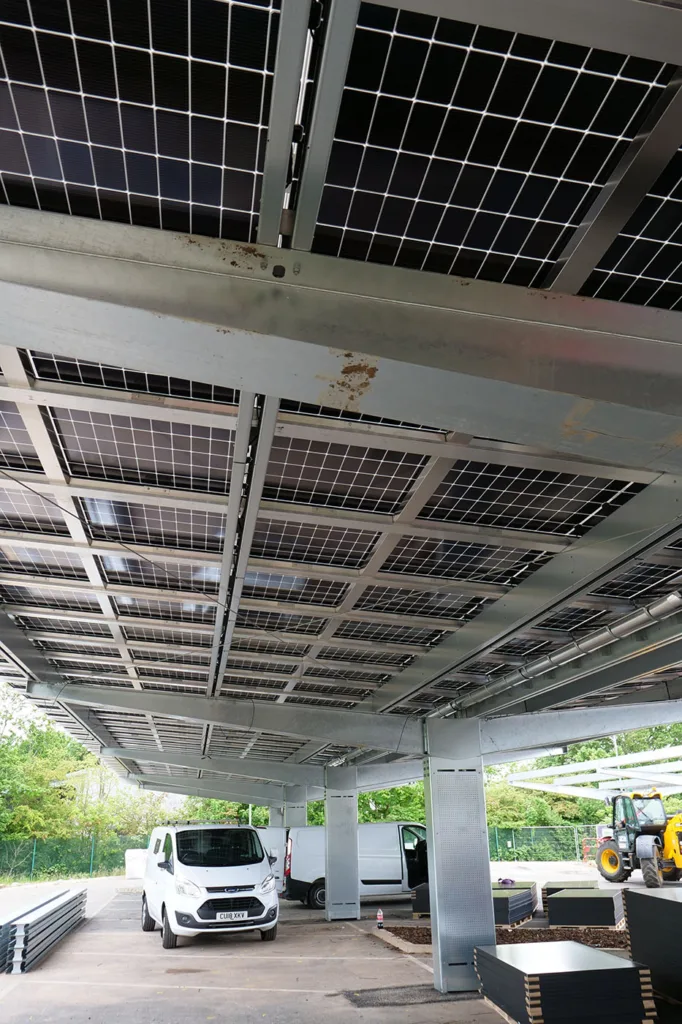
Foundation Design and Environmental Considerations
Early calculations showed that conventional footings for single-post structures would demand large concrete foundations, requiring major excavation and high volumes of concrete, a poor fit for a project intended to reduce environmental impact.
Rather than compromise, FMS explored alternative systems and identified an innovative pile-driven foundation method.
Each canopy post is supported by 6m steel helical piles, installed using GPS-guided precision equipment. The piling contractor scanned and mapped the ground conditions before installation, then used load-testing equipment to verify each pile’s load-bearing strength and tensile load.
Once complete, a transition plate was fitted to the top of each pile, onto which the canopy’s vertical support is fixed. The area around each base was backfilled with MOT aggregate, compacted, and tarmacked, leaving a clean, minimal surface footprint.
This system delivered significant advantages:
- Zero concrete (except for transformer slab).
- Reduced carbon footprint and environmental impact.
- Minimal excavation and faster installation.
- Easy maintenance – if ever required, a single post can be replaced without digging up large sections of car park.
It was a decisive innovation that turned potential environmental conflict into alignment with Brioche Pasquier’s sustainability ethos.
Drainage, Electrical Integration, and Safety
The canopies incorporate integrated drainage gullies running through their central beams. These direct rainwater from the panels down through controlled outlets, preventing flooding or erosion at the base.
Because water run-off patterns change when installing canopies, FMS commissioned a drainage capacity survey to confirm the site’s systems could safely handle redirected rainfall.
They also carried out a glint and glare assessment, ensuring the reflective surfaces of the solar panels would not distract drivers on the nearby A5.
Electrical design was equally detailed. The solar array connects into the factory’s high-voltage distribution system via high voltage cabling and a dedicated transformer is housed in a GRP enclosure. FMS oversaw all DNO (Distribution Network Operator) submissions, approvals and on-site coordination.
Safety was paramount. FMS installed:
- Protective steel bollards around all 26 main uprights.
- Rubber tyre bump stops at parking bays to prevent vehicle overrun.
- Barriers protecting high-voltage cables, reducing risk from accidental vehicle departure or heavy goods movements.
- LED lighting on PIR and timer sensors integrated into the canopy structure for efficient illumination and security.
The result is a structure that is not only functional and sustainable but also robust, safe, and visually striking.
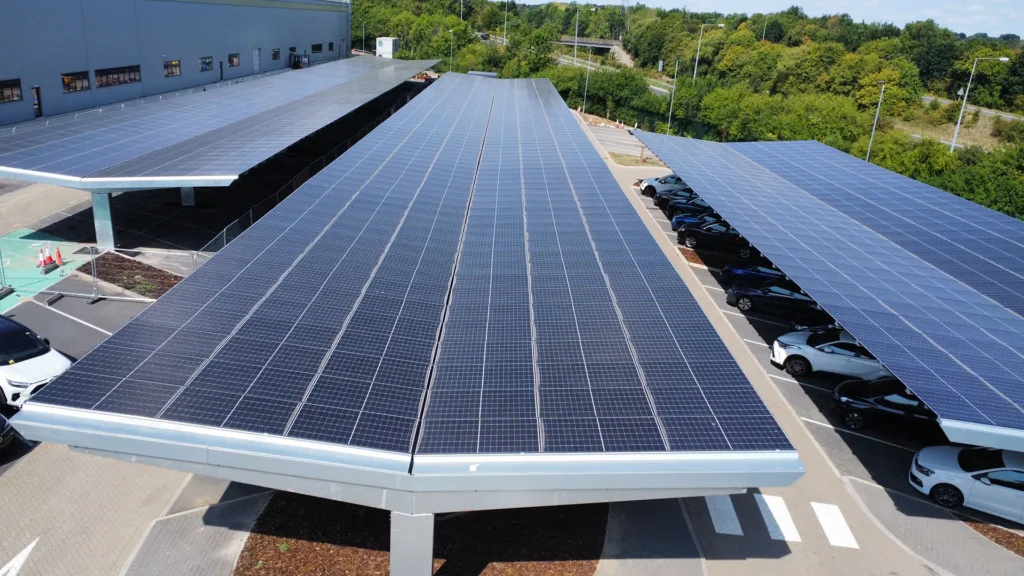
Managing Complexity and Minimising Disruption
Brioche Pasquier’s car park is the site’s only staff and visitor parking area, so downtime was not an option. FMS carefully phased construction to ensure operations continued throughout.
Each canopy structure was installed section by section, meaning that once one section was complete and energised, construction moved seamlessly to the next. Only minimal trenching was required, just short channels between canopies for cabling keeping the car park largely intact.
During the build, FMS managed all CDM (Construction, Design & Management) requirements, temporary welfare units, H&S oversight, and traffic management, ensuring a safe working environment.
FMS’s experience coordinating multi-stakeholder projects was critical here. The team maintained communication with Brioche Pasquier’s site management, security, and operations staff to schedule works, vehicle movements and staff parking zones.
Electrical, Lighting and Monitoring
The canopy supports next-generation bifacial solar panels, capable of capturing energy from both sides, harnessing not only direct sunlight but also reflected light from vehicles and the ground surface below.
Once the system was energised, FMS installed real-time monitoring displays in Brioche Pasquier’s reception area, allowing staff and visitors to see live energy generation, carbon savings, and equivalent CO₂ offset achieved.
Time-lapse cameras recorded the entire construction process, later edited to showcase the project’s transformation, a popular feature for clients wanting to demonstrate their sustainability journey.
Watch the full time lapse video below.
Funding and Financial Flexibility
FMS can provide comprehensive funding options as part of a solar proposal. Commercial solar projects can be funded in several ways:
- Self-funded – Full ownership, maximum savings immediately after commissioning.
- Part-funded – Shared cost with a lender; savings are split until the loan is repaid.
- Fully funded / Power Purchase Agreement (PPA) – Energy company or funder pays for installation; Brioche pays a discounted rate for electricity for a fixed term, then take ownership.
Carl explained:
“There’s a lot of funding options available through energy companies and commercial lenders. Because the returns are so reliable, it’s a safe bet for them. We always provide several options so clients can choose what suits their cashflow and sustainability goals.”
In this instance, BPUK self-funded the project and so benefited from maximum savings as soon as the system was commissioned.
FMS ensured Brioche Pasquier had a complete understanding of costs, returns, and payback before committing to full design & build.
Battery Storage and Future Flexibility
If a site uses large amounts of energy overnight, batteries can store excess daytime production. However, batteries come with additional cost, maintenance, and insurance considerations.
FMS presented both scenarios, with and without storage, including:
- Estimated additional investment.
- Adjusted payback periods.
- Maintenance and safety requirements (e.g. fire protection).
Brioche Pasquier’s operation runs 24/7. We explored the option of battery storage, however, as they were projected to use all energy generated by the solar array, we deemed that battery storage for this project would be unnecessary.
Carl notes:
“If batteries make sense financially and operationally, we’ll recommend them. If not, we’ll explain why. Every proposal is backed by data, so clients make informed choices.”
Completion, Safety, and Longevity
Once the canopies were completed and energised, FMS carried out final testing, commissioning, and client handover.
Additional protective posts and barriers were installed around each canopy base.
The result: a 150-space car park now generates clean energy every day while providing shaded, well-lit parking for employees and visitors.
Every kilowatt generated is used by the facility, offering energy security, dramatically reducing grid dependency and long-term operating costs.
Client Visibility and Engagement
Throughout the project, FMS maintained transparent communication and visual progress tracking:
- Regular photo and video updates.
- Comparison of design renderings vs. live build progress.
- Real-time dashboards post-completion.
Brioche Pasquier can now display their energy performance data in reception, showing staff, visitors, and customers their tangible progress towards sustainability.
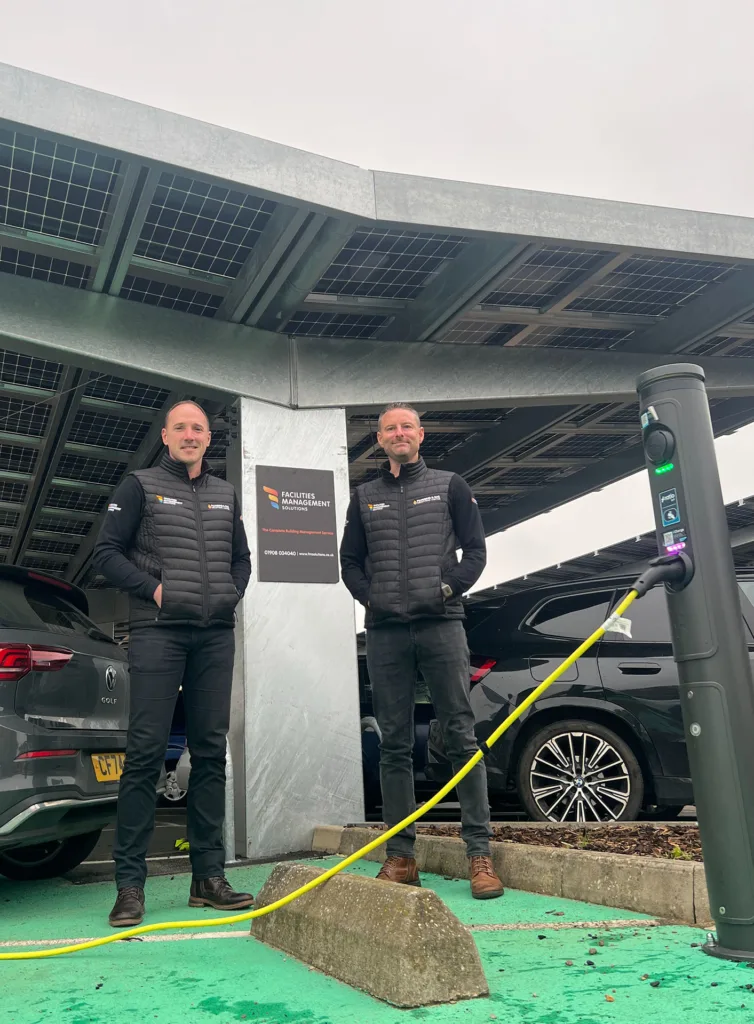
About Brioche Pasquier
Founded in 1936, Brioche Pasquier remains a family-led French bakery group renowned for its traditional recipes and authentic craftsmanship. The company operates across more than 35 countries, producing iconic products including brioche rolls, croissants, and pâtisserie desserts.
Its Milton Keynes production facility, opened in 2014, brings French baking expertise closer to UK consumers. The site is a key employer in the region and supports community initiatives such as Roald Dahl’s Marvellous Children’s Charity, MK Dons Sport & Education Trust, and the MK Marathon.
BPUK’s ethos of “quality, authenticity, and respect for people and the planet” aligns perfectly with the aims of this project turning everyday infrastructure into a statement of environmental responsibility.
Summary of Results
Feature | Specification / Outcome |
Installed Capacity | ~615 kW |
Panels Installed | ~1,158 |
Structures | 3 x steel canopies |
Funding Model | Flexible (self-funded) |
Estimated Payback | ~10 years |
Operational Savings | 25% of kWh consumed onsite |
Energy After Payback | 15+ years of free energy generation |
CO₂ Reduction | Significant – estimated 140 to 160 tonnes of CO₂ annually |
Parking Spaces Retained | 150 |
Concrete Footings Required | None (pile-driven system) |
Build Disruption | Minimal / phased |
Safety Features | Bollards, bump stops, HV barriers, PIR lighting |
Monitoring | Real-time dashboard + time-lapse documentation |
Environmental Impact
Beyond the financial return, the environmental benefits of Brioche Pasquier’s solar canopy are significant.
A 615kW system of this scale typically generates between 450,000 and 650,000kWh of clean electricity each year, the equivalent of powering around 180 average UK homes annually.
This generation avoids approximately 140 to 160 tonnes of CO₂ emissions every year, contributing directly to Brioche Pasquier’s net-zero ambitions and wider corporate sustainability goals.
Over the 25-year life expectancy of the system, that’s equivalent to more than 3,500 tonnes of CO₂ saved, a substantial and lasting environmental impact.
Why FMS
The Brioche Pasquier project exemplifies FMS’s holistic approach: technical expertise, innovation, environmental sensitivity, and client partnership.
From free feasibility analysis through surveys, funding options, design, installation, and energisation, FMS handled every stage allowing BPUK to focus on their business while FMS delivered a future-ready energy solution.
“When it comes to solar canopies,” Carl says, “we’ve honed the entire process. The initial exploration costs the client nothing. We handle every detail, surveys, design, permissions, funding and minimise disruption to the client’s operations. That’s what makes our projects successful.”
The FMS Solar Process – From Feasibility to Free Energy
Installing solar, especially at scale, can feel complex. FMS has refined a clear, end-to-end process that removes the uncertainty for clients. From the very first conversation to final commissioning, every stage is handled in-house or through trusted specialist partners, with minimal disruption to your operations.
Unlock Your Solar Potential
As Brioche Pasquier continues to benefit from reliable, clean energy every day, this project stands as a clear example of what’s possible when innovative design meets practical sustainability. For businesses exploring their own journey toward lower energy costs and greater resilience, solar can offer a transformative opportunity.
If you’re considering solar for your business, our experts can help you identify the safest, most cost-effective route to clean energy.
Contact FMS
📞 01908 034040
📧 info@fmsolutions.co.uk

